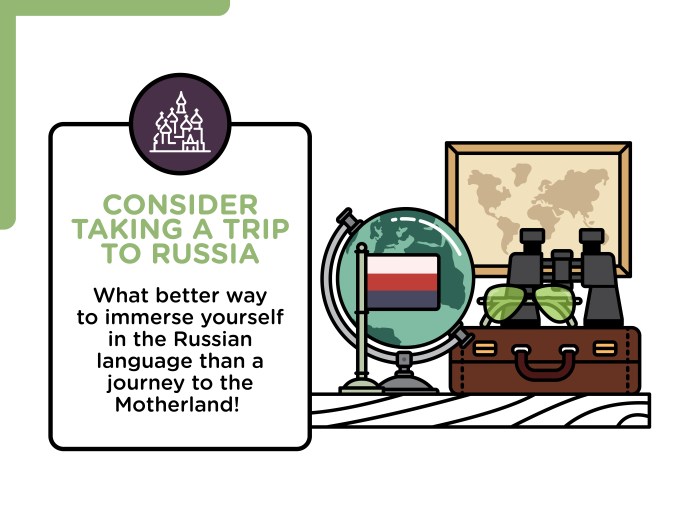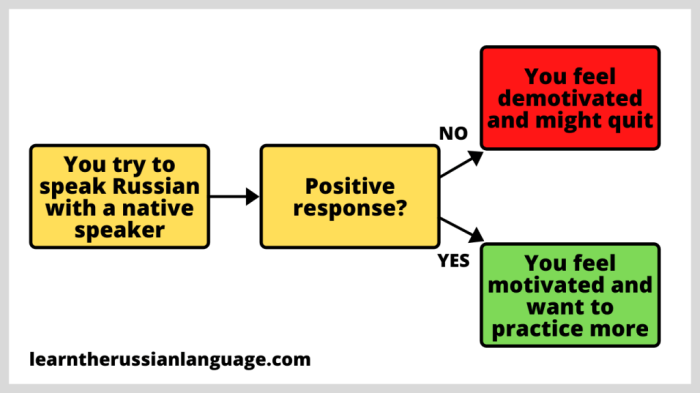How to Speak Russian Fluently: Mastering the Language with Confidence kicks off with a captivating overview of the topic, drawing readers in with insights on mastering Russian fluency step by step. From understanding the basics to immersing in the culture, this guide covers it all.
Dive into the world of Russian language learning and discover the key components that will help you speak fluently and confidently.
Understanding the Basics of Russian Language
When learning Russian, it is essential to grasp the unique phonetics, alphabet, and stress patterns that define the language.
Key Phonetics in Russian
Russian phonetics can be challenging for English speakers due to the presence of sounds not found in the English language. Some key phonetic features include:
- The rolled “r” sound, represented by the letter “p” in Cyrillic.
- The soft and hard consonants, which affect the pronunciation of vowels.
- The pronunciation of vowels, which can vary depending on stress and surrounding consonants.
The Importance of Mastering the Cyrillic Alphabet
The Cyrillic alphabet is crucial for anyone looking to speak Russian fluently. It consists of 33 letters, each with its own unique sound. Mastering the Cyrillic alphabet is essential for proper pronunciation and comprehension of written text. Without a solid grasp of the alphabet, it can be challenging to progress in learning the language.
Significance of Stress Patterns in Russian Words
Stress patterns play a vital role in Russian pronunciation and meaning. In Russian, the stress falls on different syllables in words, which can change the meaning entirely. Understanding stress patterns is essential for clear communication and accurate pronunciation.
Building Vocabulary and Grammar Skills

Building a strong foundation in Russian vocabulary and grammar is essential for fluency in the language. Let’s explore strategies for expanding vocabulary and the role of grammar in forming coherent sentences.
Expanding Russian Vocabulary
One effective way to expand your Russian vocabulary is to immerse yourself in the language. This can be done by reading Russian books, watching Russian movies and TV shows, or listening to Russian music. Make a habit of learning new words every day and using them in sentences to reinforce your memory.
- Use flashcards or vocabulary apps to practice and memorize new words.
- Practice speaking with native Russian speakers to learn new vocabulary in context.
- Keep a vocabulary journal to track your progress and review words regularly.
The Role of Grammar in Forming Coherent Sentences
Grammar is the backbone of any language and plays a crucial role in forming coherent sentences in Russian. Understanding grammar rules will help you construct sentences correctly and effectively convey your thoughts.
- Focus on mastering the Russian cases (nominative, genitive, dative, accusative, instrumental, prepositional) to understand how nouns change based on their role in a sentence.
- Learn verb conjugations and tenses to express actions accurately in different time frames.
- Study adjective endings to match them with the gender and case of the nouns they describe.
Common Grammar Rules to Focus On
While there are many grammar rules in Russian, some are particularly essential for learners to focus on:
- Verb Aspect: Understand the difference between perfective and imperfective verbs to convey the completion or continuation of an action.
- Word Order: Pay attention to the word order in Russian sentences, as it can differ from English and affect the meaning of the sentence.
- Conjugation of Verbs: Practice conjugating verbs in different tenses and moods to accurately express actions and attitudes.
Practicing Speaking and Listening Skills

To become fluent in Russian, it is essential to practice speaking and listening skills regularly. Immersing yourself in the language and finding opportunities to interact with native speakers can greatly accelerate your learning process.
Immerse Yourself in the Russian Language
One of the best ways to immerse yourself in the Russian language is to surround yourself with Russian media and content. This can include watching Russian movies, listening to Russian music, reading books or articles in Russian, and even changing the language settings on your devices to Russian. By exposing yourself to the language on a daily basis, you will improve your listening comprehension and pronunciation.
Finding Language Exchange Partners or Tutors
Joining language exchange programs or finding a Russian tutor can provide you with valuable opportunities to practice speaking Russian with native speakers. Websites and apps like Tandem, HelloTalk, or iTalki allow you to connect with language partners for virtual conversations or lessons. Additionally, local language exchange meetups or cultural events can help you find like-minded individuals to practice speaking Russian together.
Benefits of Watching Russian Movies or Listening to Music
Watching Russian movies and TV shows or listening to Russian music can expose you to authentic language use, regional accents, and colloquial expressions. This can help you improve your listening skills, vocabulary, and understanding of Russian culture. Pay attention to the dialogue, try to mimic the pronunciation, and practice repeating phrases to enhance your speaking abilities.
Overcoming Challenges in Pronunciation

When learning Russian, pronunciation can be a tricky aspect for English speakers. Here are some common pitfalls and exercises to help improve accuracy:
Identifying Common Pronunciation Pitfalls
One common challenge for English speakers is the pronunciation of rolled ‘r’ sounds, which are prevalent in Russian. Additionally, mastering vowel sounds and stress patterns can be difficult due to differences in the Russian language.
Exercises to Improve Pronunciation Accuracy
- Practice minimal pairs: Focus on words that differ by one sound, such as ‘город’ (gorod) and ‘год’ (god), to fine-tune your pronunciation.
- Use tongue twisters: Engaging in tongue twisters like “Шла Саша по шоссе и сосала сушку” can help you improve your articulation and pronunciation skills.
- Record yourself: Listen to recordings of native speakers and record yourself speaking Russian to compare and adjust your pronunciation.
The Importance of Intonation and Accent, How to Speak Russian Fluently
In Russian, intonation and accent play a crucial role in conveying meaning. Pay attention to stress patterns and intonation to ensure your speech sounds natural and comprehensible to native speakers.
Cultural Insights and Context: How To Speak Russian Fluently

Cultural understanding plays a crucial role in enhancing language fluency, as it provides insights into the social norms, values, and beliefs of a particular community. In the case of learning Russian, delving into the customs and traditions of the Russian people can greatly enrich your language skills and help you communicate more effectively.
Role of Russian Customs and Traditions in Language Usage
Russian customs and traditions are deeply ingrained in the language, influencing everything from greetings to expressions of gratitude. Understanding these cultural nuances can help you navigate social interactions and conversations more smoothly. Here are some key points to consider:
- Russian greetings often involve a kiss on the cheek or a firm handshake, depending on the relationship between individuals.
- The concept of “dusha” (soul) is important in Russian culture, influencing expressions of emotion and connection.
- Traditions like Maslenitsa (Butter Week) and New Year celebrations have specific greetings and customs associated with them.
Tips for Incorporating Cultural Elements into Language Practice
To incorporate cultural elements into your language practice, consider the following tips:
- Watch Russian films and TV shows to immerse yourself in the language and cultural references.
- Read Russian literature to gain insights into the historical and cultural context of the language.
- Participate in cultural events or language exchange programs to interact with native speakers and learn firsthand about Russian customs.
Concluding Remarks

In conclusion, mastering Russian fluency involves a combination of language skills, cultural insights, and dedicated practice. By following the steps Artikeld in this guide, you’ll be well on your way to speaking Russian with ease and confidence.